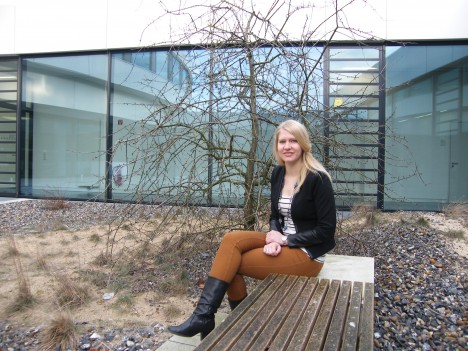What is important for a successful scientific career? Mildred Dresselhaus Awardee Dr. Liesbeth Janssen recalls her development as a mixture of enthusiasm, active engagement, and support.
Born in a village near Venlo in the Netherlands, Dr. Liesbeth Janssen studied Chemistry at the University of Nijmegen, spent three postdoctoral years at Columbia University in New York and now continues her research at Heinrich Heine Universität in Düsseldorf.

During her visit to Hamburg for the Mildred Dresselhaus Award Ceremony, Dr. Liesbeth Janssen gave insights into her career. Credit: CUI, Adler
“New York was great but the university in Düsseldorf is also a great institution. There is a very collaborative atmosphere and many great people work there,” says Janssen, whose enthusiasm is just spreading to Hamburg as well: As CUI’s Junior Mildred Dresselhaus Awardee she will soon have the chance to work with the experimental groups at Campus Bahrenfeld. “This is really exciting because I will get new data for my research and at the same time I can follow the output of my theoretical work,” the scientist says.
It almost comes as a surprise that Janssen has not always been as convinced about her career: “It took me a while to figure out what I want to do.” Although initially interested in psychology, she started studying biochemistry. Once a student at university, however, she quickly realized how good she was in physics – something she would never have thought possible at school. “It really helps if somebody guides you in the right direction,” she claims. Neither of her parents had the opportunity to study at a university, but they were very supportive of their four children. In addition, Janssen describes her mother as an “incredible strong woman” who succeeded in combining motherhood with a career for herself – so besides Marie Curie she is still the perfect role model. Later on in her career, Janssen very much appreciated the American attitude that “you can make it happen” in combination with her postdoctoral advisor saying: “You have to do your best and try to bring out all your potential.”
This environment pushed her to step out of her comfort zone and cross boundaries: After reading an article about the process when liquid becomes a glass and the many unresolved fundamental questions associated with this phenomenon, she got interested immediately, even though the topic was completely unrelated to her earlier PhD work. “I wrote an email to the researcher, Prof. David Reichman, asking whether I could do a postdoc – and he placed confidence in me,” Janssen recalls her development as a mixture of active engagement and support. As it happens, support and networking bore further fruit, in making her aware of the Mildred Dresselhaus Programme: “It is very useful to have a support network you can always fall back on. Moreover, if you want to push your career, you have to go to conferences, talk to people and present your work. The Mildred Dresselhaus is a great program for that and having a few month time is a good period.” Janssen will join CUI at the end of May – and she is already very much looking forward to get to work directly with the experimentalists: “As a theorist you never get to see the experiments. That’s very exciting.” Besides from doing research, Janssen loves to explore cities: “New York was great – Hamburg will be great for that, too.”

